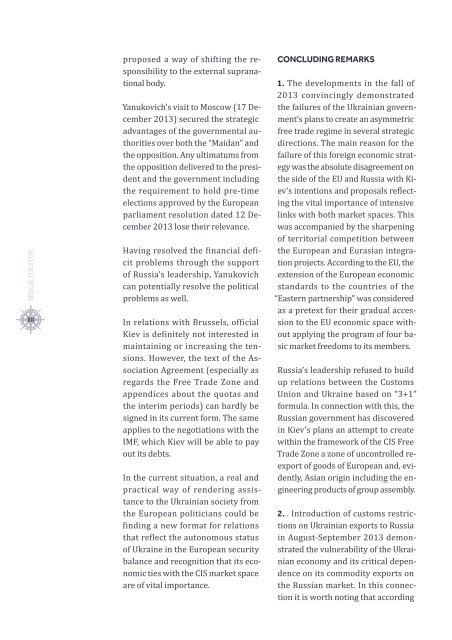Caspian Report - Issue 06 - Winter 2014
You also want an ePaper? Increase the reach of your titles
YUMPU automatically turns print PDFs into web optimized ePapers that Google loves.
SERGII TOLSTOV<br />
104<br />
proposed a way of shifting the responsibility<br />
to the external supranational<br />
body.<br />
Yanukovich’s visit to Moscow (17 December<br />
2013) secured the strategic<br />
advantages of the governmental authorities<br />
over both the “Maidan” and<br />
the opposition. Any ultimatums from<br />
the opposition delivered to the president<br />
and the government including<br />
the requirement to hold pre-time<br />
elections approved by the European<br />
parliament resolution dated 12 December<br />
2013 lose their relevance.<br />
Having resolved the financial deficit<br />
problems through the support<br />
of Russia’s leadership, Yanukovich<br />
can potentially resolve the political<br />
problems as well.<br />
In relations with Brussels, official<br />
Kiev is definitely not interested in<br />
maintaining or increasing the tensions.<br />
However, the text of the Association<br />
Agreement (especially as<br />
regards the Free Trade Zone and<br />
appendices about the quotas and<br />
the interim periods) can hardly be<br />
signed in its current form. The same<br />
applies to the negotiations with the<br />
IMF, which Kiev will be able to pay<br />
out its debts.<br />
In the current situation, a real and<br />
practical way of rendering assistance<br />
to the Ukrainian society from<br />
the European politicians could be<br />
finding a new format for relations<br />
that reflect the autonomous status<br />
of Ukraine in the European security<br />
balance and recognition that its economic<br />
ties with the CIS market space<br />
are of vital importance.<br />
CONCLUDING REMARKS<br />
1. The developments in the fall of<br />
2013 convincingly demonstrated<br />
the failures of the Ukrainian government’s<br />
plans to create an asymmetric<br />
free trade regime in several strategic<br />
directions. The main reason for the<br />
failure of this foreign economic strategy<br />
was the absolute disagreement on<br />
the side of the EU and Russia with Kiev’s<br />
intentions and proposals reflecting<br />
the vital importance of intensive<br />
links with both market spaces. This<br />
was accompanied by the sharpening<br />
of territorial competition between<br />
the European and Eurasian integration<br />
projects. According to the EU, the<br />
extension of the European economic<br />
standards to the countries of the<br />
“Eastern partnership” was considered<br />
as a pretext for their gradual accession<br />
to the EU economic space without<br />
applying the program of four basic<br />
market freedoms to its members.<br />
Russia’s leadership refused to build<br />
up relations between the Customs<br />
Union and Ukraine based on “3+1”<br />
formula. In connection with this, the<br />
Russian government has discovered<br />
in Kiev’s plans an attempt to create<br />
within the framework of the CIS Free<br />
Trade Zone a zone of uncontrolled reexport<br />
of goods of European and, evidently,<br />
Asian origin including the engineering<br />
products of group assembly.<br />
2. . Introduction of customs restrictions<br />
on Ukrainian exports to Russia<br />
in August-September 2013 demonstrated<br />
the vulnerability of the Ukrainian<br />
economy and its critical dependence<br />
on its commodity exports on<br />
the Russian market. In this connection<br />
it is worth noting that according










